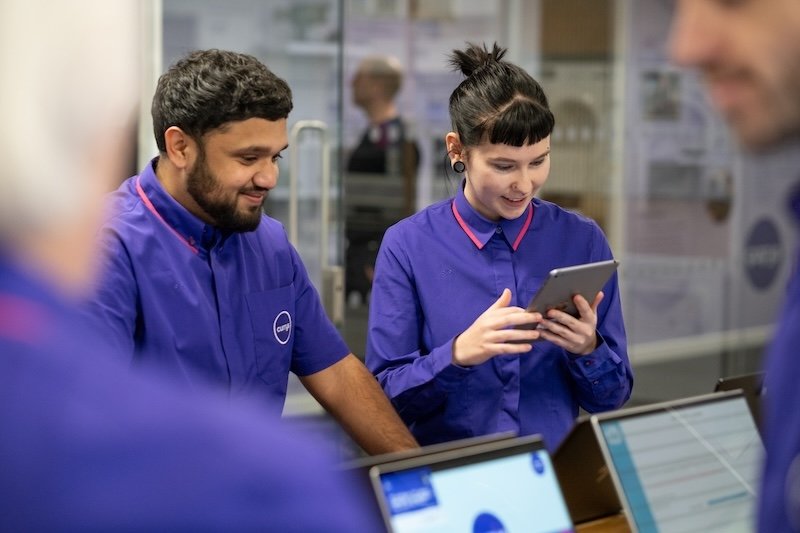Interview: FreedomPay’s Chris Kronenthal on the third generation of tech and orchestrating the future
In an interview at Retail Technology Show 2023 last week in London, where FreedomPay unveiled research showing consumers favour an omnichannel approach, Chris Kronenthal, President of the FinTech, argued that a digitally enabled customer experience (CX) that doesn’t forget in-store is what is needed as the third era of more open personalised tech takes off. Orchestrating the data deluge will be key.
“There is so much payments, data and other innovation around right now,” said Kronenthal,, alluding to the rise of Open Banking and application programming interfaces (APIs) that are linking seamless customer journeys, apps and payments evermore tightly together in a connected 21st century era of e-commerce.
“But how you orchestrate and tie it all together is crucial.”
This is especially true during the present tough times where value and service are key differentiators for retailers in a hard trading environment where consumers expect to be able to look for bargains online and convert in-store, be recognised across loyalty programmes, get fast and easy service, delivery, payment and credit options, and so on.
Should retailers rely on their banks, third-party processors, themselves or a multitude of partners to cope with the dizzying array of real-time payment options from contactless to in-app, to account-to-account (A2A) payments under the UK Open Banking regime, to old style, slower card payments or in-store PoS transactions?
Do retailers need to use a microservices approach internally and containerisation in their operations to handle the deluge of data flying at them from loyalty schemes; personalised marketing strategies; AI machine learning enabled fraud detection and automated service systems; and so on?
Or can they leave all that operational stuff to third-parties that can front-end it for them allowing them to concentrate on the customer, as all retailers intrinsically want to?
“These are the types of questions we are asked,” said Kronenthal. The emphasis is often on:
· How you can pull together all of the data from payment transactions to help a treasury;
· How can marketing better identify customers as they enter a store, or log online to your shop or loyalty scheme;
· How can you orchestrate in-app, marketing or social media interactions with store data and a multitude of payment or credit options like buy now pay later (BNPL), while maintaining the operational requirement for interoperability.
In the payments area having clear people and money pathways is especially important as shops want to take and encourage revenue easily – “whether that is from promotions with seamless payment journeys, to BNPL options, or Amazon’s Palm Reader, Tap2Pay or whatever other source.”
Orchestration
“The last payments processing request for proposal (RFP) I did, had a title with orchestration in it – gateways or other such old fashioned language wasn’t in it at all,” Kronenthal commented.
This illustrates the multifaceted era we are now entering where payments, data centric personalisation, identity platforms, apps, stores, and so on are all merging into an omnichannel approach where the customer is king.
The customer is unthinking about the back-end processes that go into delivering them a seamless data-rich service. They just want an easy, quick, data centric connected CX and they don’t care how they get it.
This is what Kronenthal likes to call the third generation of technology, where open APIs enabling easier data exchange practices and co-creation of products, is to the fore:
· First Gen. of Tech: arose with the world wide web and the initial dot.com e-commerce boom in the 1990s.
· Second Gen. of Tech: After the millennium, we had FinTechs coming to the fore, with the likes of Stripe, Square and so on, offering closed loop seamless systems of service. But retailers have to cope operationally with numerous linkages.
· Third Gen. of Tech: is what we’re in now. Customers want to pick their own retailer for a pre-identified product with their own banking, payment, loyalty and other such options catered for in an open ecosystem that personalises the service to them. This is often powered by open API powered means of easy data exchange.
“The first iteration of e-commerce was clunky. But from 2005 onwards it got much more granular, albeit in a closed loop manner,” said Kronenthal.
“The present third era of technology is more open. Sentient and connected technology that delivers a seamless CX is the name of the game now,” he explained.
“Open Banking and APIs are creating evermore integrated ecosystems and overlaps between them. But the customer themselves is prioritising convenience – often desiring of a single ‘super app’ that rules them all from their mobile phone app.”
“This should offer data rich comparison services, finance, credit, banking, shopping, loyalty, payment, delivery / collection tracking and so on all from one app in a connected 21st manner.”
“The retailer is somewhat fatigued co-operating with a multitude of second generation operators and forever trying to avoid legacy IT, closed loops and so on, as they map out their future technology stacks,” added Kronenthal.
“Consumers too don’t want to be forever entering their personal data, passwords and so on to lots of different standalone systems. That is why I believe the future of more connected systems is bright.”
Of course, Kronenthal would like to think all this will be orchestrated by a third-party payment and data processor, such as FreedomPay, delivering a holistic service to their end point customers in retail, lodging, gaming or wherever other sectors.
But whether to outsource operations in this manner, in part or whole, is a decision that each business must make for themselves – based upon their internal resources, the expertise of their own operations staff, IT and orchestration capabilities, and so on.
AI and crypto
Data, personalisation, and the future of payments in a more Open Banking and API enabled technology environment, were big topics of conversion at Retail Technology Show 2023.
But Kronenthal thought artificial intelligence (AI) was right up there too, among the thousands of attendees. It will play a major part in linking together 21st century consumers and businesses’ digital lives, but comes with numerous ethical, governance and other concerns.
“ChatGPT could effectively tell you how to target a consumer, but is that AI-powered deep personalisation right?” asked Kronenthal. “Particularly if consumers give permission unthinkingly ticking the T+Cs button without enough knowledge?”
“I think there is a role for tech companies to be somewhat responsible on their behalf. Maintaining the ‘human-in-the-loop’ concept as a controlling parameter for AI systems is also an important consideration. It is very early days for AI. But it is already having an impact.”
One topic that Kronenthal believes was “ghosted” at Retail Technology Show 2023 was crypto. “There hasn’t been a lot on digital currencies, blockchain end uses in the supply chain or non-fungible token (NFT) digital identifiers,” he said.
Perhaps this is understandable due to the ‘crypto winter’ and the reputational damage done to the sector by Sam Bankman-Fried, CEO at the collapsed FTX cryptocurrency exchange.
But central bank digital currencies (CBDCs), which are being piloted by hundreds of central banks around the world, suggest the underlying distributed ledger technology (DLT) will play a role in the future of 21st century commerce.















